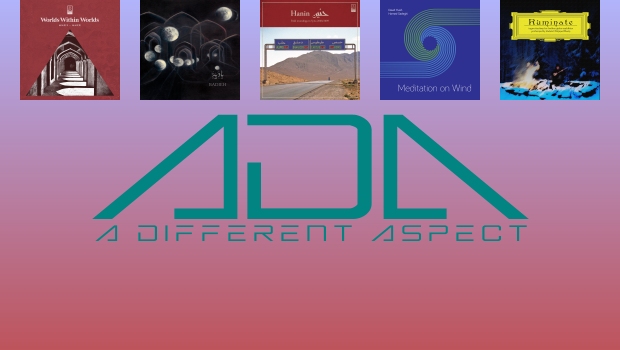Featured artists: Various Artists (VA) | Badieh | Various Artists (VA) | David Hush & Hamed Sadeghi | Gabriel Akhmad Marin ||:
In this ADA update we feature albums released by the Australia based Worlds Within Worlds record label.
• Various Artists (VA) – Worlds Within Worlds Label Sampler 2019-2021
• Badieh – Badieh
• Various Artists (VA) – Hanin: Field Recordings in Syria 2008/2009
• David Hush & Hamed Sadeghi – Meditation on Wind
• Gabriel Akhmad Marin – Ruminate
Nick Hudson
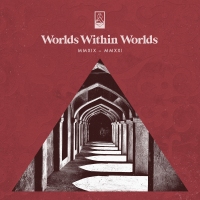
In 2018, Lachlan Dale diversified from his Art As Catharsis label with a new label devoted to classical and contemporary music of non-Western origin, whether folk or fusion, traditional or progressive. Like myself, Lachlan is not a particular fan of the term “world” music, which is contentious to say the least. I wrote quite a diatribe upon the subject, in relation to how systemic and inherent racism can pervade the way we describe music, (read it here), and Lachlan’s use of the phrase “world music” on the Worlds Within Worlds Bandcamp page is clearly an exercise in pragmatism and expediency, given the advocacy for non-Western culture on the label’s and his own personal Facebook page. Indeed, the label name itself precludes the notion that there is western music and then there is (the rest of the) world music, but rather that there are worlds within worlds (as opposed to worlds apart, which is how world music has historically been proposed). It doesn’t seem much of a step to view the label’s acronym as a comparison with the World Wide Web – bringing the world together, and breaking down geographic distances and borders along the way.
In the beginning, there was perhaps a little too much crossover between the Worlds Within Worlds roster and that of Art As Catharsis. There were albums released on WWW that would not be greatly out of place on AAC, and vice versa. Indeed, Eishan Ensemble’s debut album was originally an AAC release, before being moved to the new imprint (their follow-up, which I reviewed for TPA, returned to the AAC stable) and Yama Warashi’s rather brilliant album came to the WWW label more because of the collaboration between AAC and Small Pond, and the timing of its release. It makes sense then, that neither of these two 2018 releases have a track featured on the label sampler, and that the first track of this compilation comes from the first “true” release of the label, Qais Essar’s I Am Afghan, Afghan Is Currency, Vol III. I have already reviewed for TPA some of the releases from which tracks are pulled for the sampler (3,14; Josh Feinberg; Alam Khan), and it is interesting to hear these familiar tracks in this new setting.
So often label samplers simply cobble together tracks seemingly without regard to how well they work together. The sequencing on this is superb, however, and shows the care and consideration that has been put into creating (or, perhaps, curating) it. Much of the music on the sampler comes from the intersection of eastern and western musical worlds, and it is fascinating to hear these pieces together – plucked from different releases, and written and performed in different ways, with quite different instrumentation and composition; yet sounding like one perfect, cohesive whole. A World Wide Web of music, indeed. Musicians from almost every continent can be found within the credits, and often the music is not of one country or region, so much as inspired by the interaction and relationships between countries and regions. Even before the Silk Road, there was the Steppe Route, and there has always been a trade and reciprocity between east and west. Worlds Within Worlds celebrate that beautifully with this sampler, and there is plenty to intrigue and enthuse a progressive music fan.
Nick Hudson
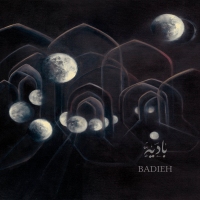
As the world spins, it’s only natural that what once was, comes around again. It seems appropriate then, that one of my favourite 2021 releases from Worlds Within Worlds comes from Michel Gasco, whose album with Orontes (Dancing on the Heads of Snakes) was one of the three 2019 releases from the label, and probably my favourite of those three. Gasco is from Spain, but draws inspiration from far further afield. While the music of Orontes is comprised of original compositions, the music of Badieh is comprised of arrangements of traditional folk music. And yet, the difference between the two is less than that might convey. The music of Badieh is the music of the steppe of the Greater Khorasan region, and indeed Badieh is an Arabic word that means steppe. The Greater Khorasan region was part of the Steppe Route, and later the Silk Road, which is kind of neat as it is another thread that links this release to others on the Worlds Within Worlds label.
The region includes parts of modern day Iran and Afghanistan, and the folk music comes from both these countries, and is played by the instruments from the two. The Afghanistan rubab played by Gasco complements beautifully the Iranian tar played by Mohammad Miraghazadeh, and honestly as ancient as some of these melodies might be, they sound completely contemporary. Some music is simply ageless, I guess. Although, it should be noted that as much as these are arrangements of traditional tunes, they are probably better described as rearrangements, or perhaps reinterpretations. The intensity of the playing belies the more humble origins of the melodies. In addition to the two aforementioned instruments, Gasco plays the oud (as he did on the Orontes album), and Miraghazadeh the setar. These comprise the majority of the music played, although there are guest musicians who add other instrumentation to a few of the tracks. Because Gasco has a background in Arabic and Afghan music, and Miraghazadeh in classical Persian music, they each bring something quite different to the table.
The new arrangements by Badieh are a valuable artefact: a celebration, continuation and preservation of musical traditions centuries old. But sometimes it takes more than just playing the notes. Some of the numbers on Badieh’s album are Herati. Just four days after the release of Badieh, on 12th August 2021, Herat (the Pearl of the Khorasan, gateway to Iran, oasis, and ancient Silk Road trading city) fell to the Taliban. It’s now possible to face death for playing music, or making musical instruments, and almost any activity relating to music is violently suppressed. An Australian based record label, and a Spanish musician, as well as seeking and making donations to charities helping Afghan musicians and refugees, applied for grants to record Afghan musicians in Iran, and even successfully campaigned to raise money to help a traditional instrument maker and his family escape the country. The events of the Taliban “summer offensive” of 2021 make Badieh an even more meaningful and moving experience than it already would have been.
Nick Hudson
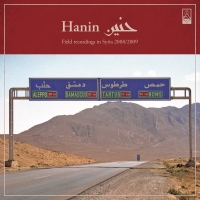
Michel Gasco (Orontes, Badieh) lived in Syria for the two years these field recordings were made over. The first single from Orontes’ 2019 Worlds Within Worlds release, Dancing on the Heads of Snakes, was a tribute to the time Gasco lived there: “I really miss it and feel terrible about what happen to my friends there and the whole country – but at the same time I didn’t want to compose something sad and nostalgic. For me it was more like reproducing the atmosphere from when I lived there, sometimes heavy and dense, hypnotic, almost as if life moves slow as if it was going to stop. Then you realize that it never does, and suddenly you are in the middle of this amazing, unexpected situation. It’s very difficult to explain all these feelings about it.” With the release of this compilation of field recordings he made, Gasco is once more able to celebrate the diversity and vibrancy of Syrian music, before the war (the conflict now more than ten years ongoing).
Just as Afghani musicians and instrument makers have had to flee the country since the Taliban took control, if they wish to continue their profession, so too have their Syrian counterparts. As the Bandcamp page states, half of the musicians who feature on this compilation have been forced to leave the country, but wherever they are, Gasco has maintained contact with them, and all profits from the sale of this album will go to the musicians who performed on it. I find it hard not to listen to this album without a smile, as the music seems so joyful and spontaneous. A selection of pieces acoustic and electric, vocal and instrumental, improvised and composed, solo and ensemble; it’s a truly eclectic mix that just feels vital and alive. The Bandcamp page calls the album a snapshot, and there is definitely the feel of something fleeting and ephemeral. All of these performances sound as if they are of the moment, and given the history that has happened since, it’s almost miraculous that these moments were captured, and that we are able to hear them today.
The recordings come from across Syria, from cities, villages and the desert. There is nothing else like this on the Worlds Within Worlds label. It is an anomaly, but it is a glorious one. I’m not sure how possible it would ever be, but I’d love to hear more compilations like this. That would require someone to have the time and money (Gasco had a grant from the Spanish government) to be able to spend on such a project. That would not have been too likely before covid, and is probably even less possible now. So I guess I just have to be glad that this exists at all. Maybe, despite the diaspora, it would be possible to reunite some of the performers and musicians to remotely record a follow-up of sorts? I’m clutching at straws, I know, but there’s too much good stuff on this album for there not to be another chapter.
Nick Hudson
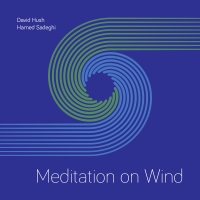
David Hush and Hamed Sadeghi provided one of the first “true” releases of the Worlds Within Worlds label, back in 2019. In 2021, their follow-up arrives, and it is very different from its predecessor. The cover art for 2019’s Harmony probably better depicts the music of the album than its title. I think it was Rudyard Kipling who coined the phrase that east is east and west is west, but never the twain shall meet. The two birds on the cover of Harmony could well be coming from eastern and western origins, like the two musicians who play on the album. But as close as they come, they don’t quite meet. Those birds also evoke the image of yin and yang, and the idea that obviously opposite forces can be complementary. The two don’t have to be together to be in harmony. And so it is with Harmony, as the piano of Hush and the tar of Sadeghi come from opposite directions, and never quite meet, rather soloing one after the other. It is an interesting way of playing, and I do like the album, but as complementary as their playing might be, I still longed to hear the two musicians play together.
Well, for approximately half of Meditation on Wind, that is what we get. Of the eleven tracks, two have the sequential soloing style of Harmony, one is performed solely by Sadeghi, three solely by Hush, and the remaining five are played together. And as much as I love this more traditional musical arrangement, where one musician accompanies the other, rather than plays after; what it’s really done has made me appreciate just how wonderful the original harmonies (or Harmony) of Hush and Sadeghi are. Indeed, the opening two tracks, which follow the pattern of the previous album, are easily two of the most enjoyable and engaging. And, perhaps strangely, what they also show is that the yin needs the yang. Even though they don’t play together on these tracks (or on Harmony), Tantraayin and the title track provide a much fuller sound and experience than the four tracks on this album where only one of the musicians plays. While these four tracks are enjoyable in their own right, they just don’t work as well for me in this setting. This is only reiterated by Prison’s inclusion on the Worlds Within Worlds Label Sampler, where it works far better, and I appreciate it so much more.
But the overwhelming impression Meditation on Wind leaves is just how little is needed to make something incredible. With just piano and tar, the music of Hush and Sadeghi fairly minimalist, but boy does it pack a punch. Maybe it’s just me, but this is not an album that can be listened to passively. It demands attention. It may be titled Meditation on Wind, but there’s no way my mind can float away with the breeze. It’s focussed, and fully engaged in taking in every note. Of course, meditation can mean many things, and it depends (like those birds on Harmony) which way you approach it. Meditation can be as simple as focussing one’s mind for a period of time, and Mediation on Wind certainly does that. One dictionary defines it as “the act of giving your attention to only one thing, either as a religious activity, or as a way of becoming calm and relaxed”. If not the former for me, it certainly works for the latter. Another definition, “to engage in mental exercise, for the purpose of reaching a heightened level of spiritual awareness.” Well, I’m not exactly concentrating on my breathing, or on any inner mantra, but I can say that I have found Bliss….
Nick Hudson
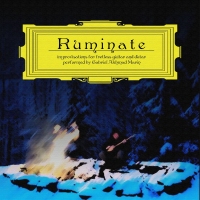
If TPA readers know of Gabriel Marin, it’s likely to be because of the extraordinary and wonderful genre spanning music of Consider The Source. Marin is a co-founder of that band, but the heavy, psychedelic mix of jazz, metal, folk, classical and traditional that you might find on a Consider The Source album is a far cry from what you’ll hear on Ruminate. That said, there are as many comparisons that could be made as contrasts. Given Consider The Source have always taken influence and instrumentation from Eurasia and the Middle East, but the joke is that if there can be post-punk, post-metal or post-rock, then there can certainly be post-world, and if there is, then consider Consider The Source to be the source. They are a true world music group, in that they care not for geographical boundaries, fusing musical styles from around the world.
In this respect, despite sounding far more like what most people assume “world music” sounds like, Ruminate is still similarly “post-world”. The geography is perhaps more specific, but the melodies are still mixed. As per the album’s subtitle, Ruminations is a series of improvisations. These are all inspired by the music one might historically have heard along the Silk Road, hence my suggesting that the geography is perhaps more specific. However, contrary to popular knowledge, there was no one single Silk Road, but many, and even if there had been just one, it still had to pass through many regions and cultures. Marin doesn’t necessarily stick to any one at any one time, so, for example, Persian phrasing mixes freely with Eastern European. The opening salvo of Sunset and Wings is incredible, and it’s not a great surprise these two tracks were the first two singles released from the album.
Overall, though, no matter the amount of fusion in the improvisation, this is (as the title Ruminate might infer) slow and calm for the most part. Given Marin is known for some fairly crazy musicianship, this is certainly a very different side of his playing – but if he is out of his comfort zone, he doesn’t show it at all! Much of this is surely down to Marin’s virtuosity on his chosen instruments. The music is played on fretless guitar and dutar (a long necked, two stringed lute), and it’s beautiful and intricate and animated. At times you’d swear you’re listening to woodwind rather than stringed instruments. So much so, that some of the tracks have already appeared on Spotify playlists with titles like “Masters of Flute Meditation”. Throughout the album, any woodwind sounds you hear will be down to the way Marin plays his fretless guitar, and it’s pretty damn cool.

